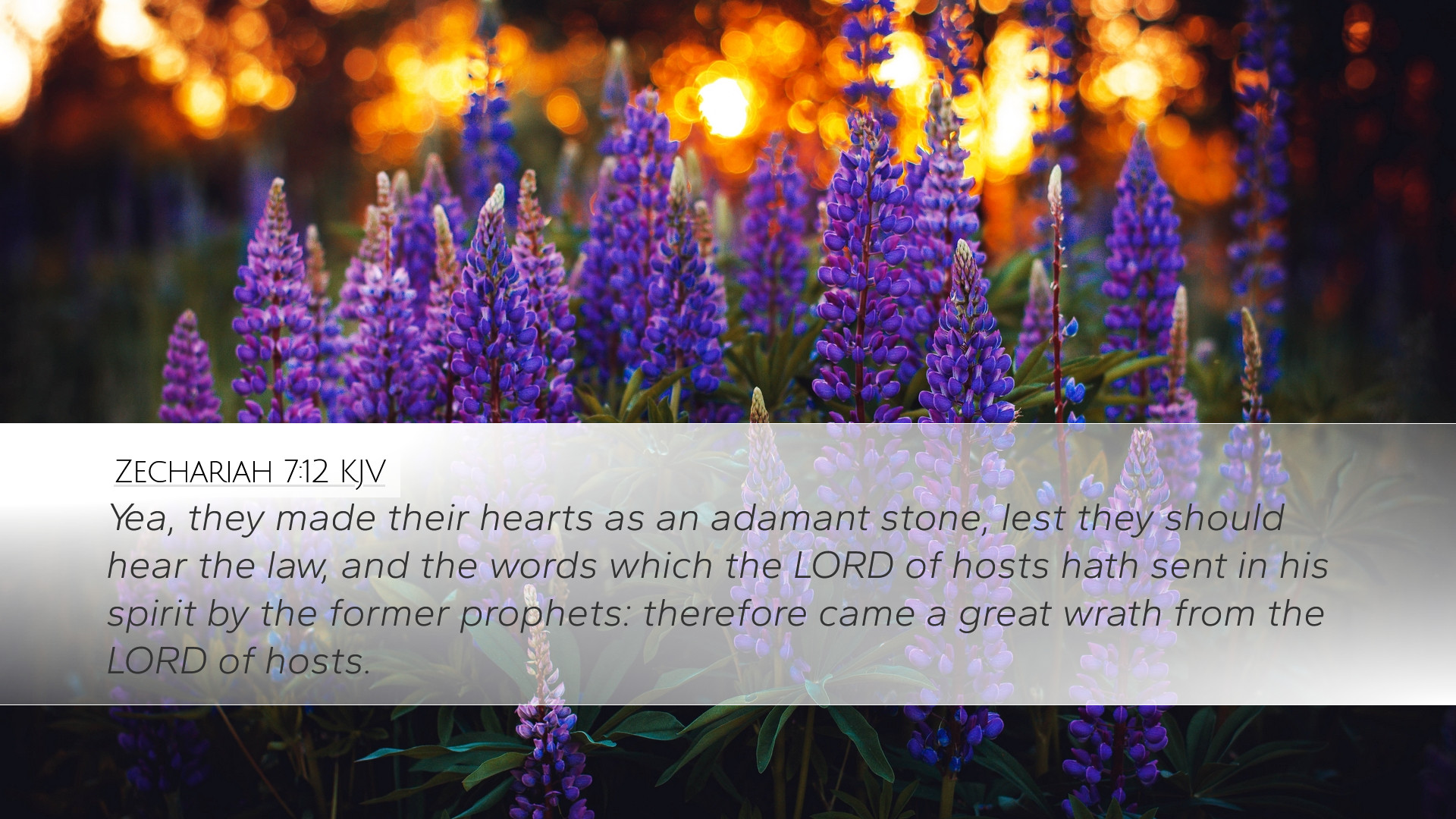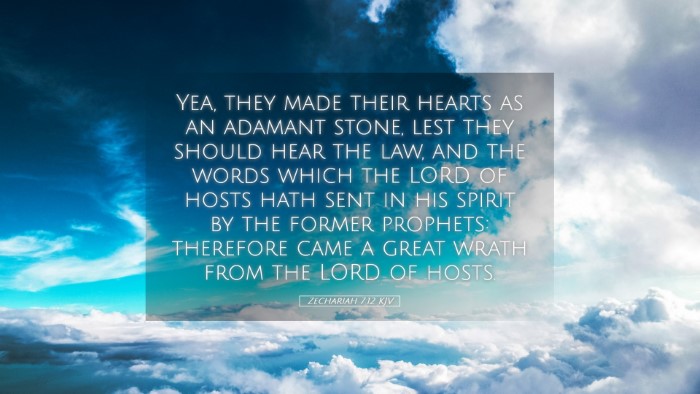Old Testament
Genesis Exodus Leviticus Numbers Deuteronomy Joshua Judges Ruth 1 Samuel 2 Samuel 1 Kings 2 Kings 1 Chronicles 2 Chronicles Ezra Nehemiah Esther Job Psalms Proverbs Ecclesiastes Song of Solomon Isaiah Jeremiah Lamentations Ezekiel Daniel Hosea Joel Amos Obadiah Jonah Micah Nahum Habakkuk Zephaniah Haggai Zechariah MalachiZechariah 7:12
Zechariah 7:12 KJV
Yea, they made their hearts as an adamant stone, lest they should hear the law, and the words which the LORD of hosts hath sent in his spirit by the former prophets: therefore came a great wrath from the LORD of hosts.
Zechariah 7:12 Bible Commentary
Commentary on Zechariah 7:12
“Yea, they made their hearts as an adamant stone, lest they should hear the law, and the words which the LORD of hosts hath sent in his spirit by the former prophets: therefore came a great wrath from the LORD of hosts.”
In this verse, Zechariah addresses the hard-heartedness of the people of Israel in response to the prophetic words of God. The imagery of an "adamant stone" signifies an unyielding and stubborn disposition that resists divine instruction. This commentary will explore the implications of this verse in depth, incorporating insights from classical public domain commentaries.
Insights from Matthew Henry
Matthew Henry emphasizes the spiritual blindness that afflicts those who willfully resist God’s word. He notes that the phrase “made their hearts as an adamant stone” indicates a deliberate choice to dismiss the messages delivered through God’s prophets. This hardening of the heart is not merely passive; it is a conscious act of rebellion against the divine truth.
- The Nature of Hardness: Henry explains that such hardness leads to an inability to perceive truth. When individuals turn a deaf ear to God's commands, they cultivate an environment where wrath can take root.
- Divine Communication: He also comments on the importance of listening to God, stating that God communicates through His Spirit. The people’s failure to heed these warnings resulted in significant consequences—God's wrath was kindled against them.
Insights from Albert Barnes
Albert Barnes provides a historical context to the message of Zechariah, suggesting that it reflects post-exilic attitudes among the Israelites. He points out that the people's neglect of God’s word led to spiritual apathy, which ultimately invited divine retribution. Barnes draws attention to several critical themes:
- Resisting Enlightenment: Barnes remarks that rejecting God's law leads to a spiritual blackout where the individual's heart is rendered incapable of discerning right from wrong.
- The Role of Prophets: He affirms the significance of the prophets as mediators of God's will, warning that ignoring their messages places individuals in grave peril.
- Consequences of Rejection: Finally, he connects their hardness of heart to the forthcoming wrath, reminding readers that God’s justice will not remain silent in the face of disobedience.
Insights from Adam Clarke
Adam Clarke offers a detailed examination of the text, focusing on the metaphorical meanings inherent in the language used. He explains that making one's heart hard like "adamant" is tantamount to creating barriers against God’s truth:
- Spiritual Stagnation: Clarke describes this hardening process as one that leads to spiritual stagnation and decay. The longer one persists in this blindness, the more entrenched they become in sin.
- Warning Against Indifference: He stresses that this verse serves as a caution to believers not to adopt an indifferent attitude toward divine communication. Each refusal to listen has larger implications for one's spiritual life.
- God’s Long-Suffering: Clarke highlights God's patience in sending His prophets, reflecting the unending love and desire for restoration present in God's character.
Theological Implications
The verse in Zechariah 7:12 serves as a profound warning about the dangers of spiritual obstinacy. The collective insights of these commentators suggest a few key theological implications:
- Human Responsibility in Spiritual Openness: There is an inherent call to believers to remain open to the prompting of the Holy Spirit and attentive to the teachings of Scripture.
- The Severity of Divine Judgment: The connection between hard-heartedness and divine wrath underlines the seriousness with which God takes His covenant relationship with His people.
- The Nature of Prophetic Witness: The prophetic tradition plays a crucial role in guiding God’s people. The text illustrates how dismissing prophetic voices can lead to significant spiritual decline.
Conclusion
Zechariah 7:12 challenges believers to reflect on their posture toward the word of God and the messages of His ministers. The combined insights of Matthew Henry, Albert Barnes, and Adam Clarke emphasize the necessity of being vigilant against the tendency to harden one’s heart. As people of faith, the call is not just to hear but to actively respond to the voice of the Lord, for in responding lies the path to spiritual vitality and communion with God.


